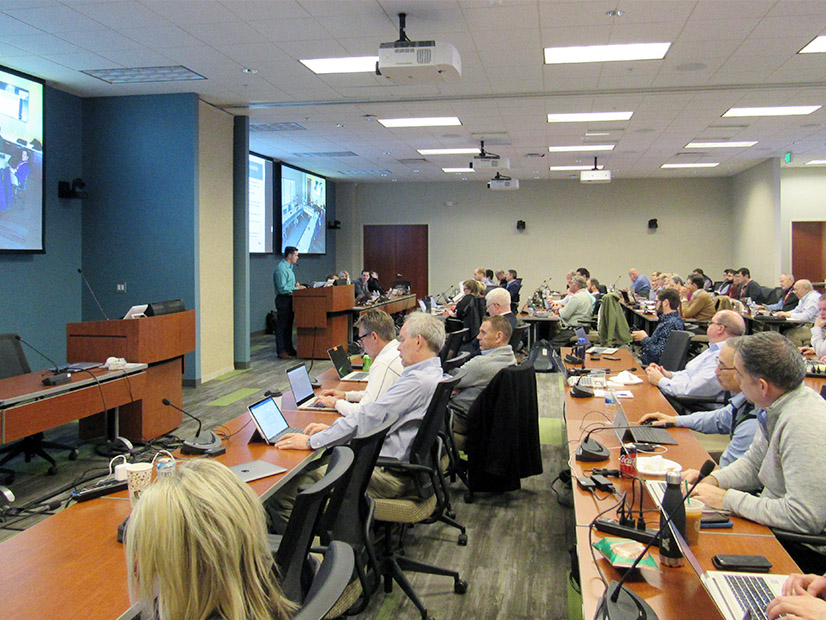
The February 2020 Resource Adequacy Subcommittee was one of the last meetings MISO held in-person.
| © RTO Insider LLCMISO has scrapped its plan for a meeting schedule that would have packed all major stakeholder meetings into a single week eight times per year.
Instead, the grid operator will stagger eight meetings of its main stakeholder committees across the year, alternating between in-person and virtual formats. The modified schedule still will have MISO holding fewer stakeholder meetings throughout the year.
The RTO said in September that it planned to squeeze all stakeholder meetings of its main parent entities into eight separate weeks over the year, creating “superweeks” consisting of all-day meetings. The new calendar was to take effect next year. (See MISO Wants Abridged Stakeholder Meeting Schedule.)
MISO defines its main parent entities as the Market Subcommittee (MSC), Resource Adequacy Subcommittee (RASC), Reliability Subcommittee, Planning Advisory Committee, and Regional Expansion Criteria and Benefits Working Group, which makes cost-allocation decisions. The committees currently meet monthly in separate weeks dubbed as planning week, markets week and reliability week.
The grid operator’s head of stakeholder relations, Bob Kuzman, said the new schedule will allow MISO to preserve its markets week and planning week.
“We heard your feedback, and we made a lot of changes to the proposal,” he told stakeholders during Wednesday’s RASC teleconference. “We heard that superweeks were going to provide too much information for stakeholders to digest.”
In response, the RASC and MSC only approved the first five months of their 2022 meeting dates. The committees usually set a full calendar year of meetings during their December meetings.
RASC Chair Chris Plante said committee chairs will still have to make sure their workplans and goals will be able to fit into the new calendar.
Speaking on behalf of his company, WEC Energy Group, Plante said he was willing to give the new meeting frequency a try.
MISO client relations staff had framed the new meeting schedule as a transition to in-person meetings after two years of pandemic-induced isolation.
Kuzman said MISO will review the schedule with stakeholders in May to gauge its effectiveness. “This allows the face-to-face meetings as we get back to an in-person schedule.”
He also said the new schedule will give staff subject matter experts respite between meetings to ready discussion points and meaningfully tweak proposals based on stakeholders’ suggestions.
“MISO can get a little bit better prepared for the meetings, with better material and better answers to stakeholders’ questions,” Kuzman said.
The RTO had said the meetings’ monthly pace was leaving staff in a cycle of preparing and delivering presentations, sometimes reciting information from identical slides across different committees.
The grid operator’s first vision for pared-down in-person meetings proved unpopular with stakeholders.
In November, Plante said MISO should have consulted with stakeholder committee chairs to determine whether the groups could cover 12 months of agenda items across just eight meetings a year.
Plante also said there was probably a better way of limiting COVID-19 exposure between stakeholders and MISO staff. MISO said fewer in-person meetings might lessen the chances that someone contracts the coronavirus.
“I would have much rather seen us maintain the monthly meetings with an in-person meeting every other month,” Plante said during a Nov. 4 MSC meeting.
“We were not approached about whether this would have been a good thing,” MSC Chair Megan Wisersky said. “I’m concerned there wasn’t enough stakeholder discussion outside of the Advisory Committee.”
Wisersky also questioned whether the schedule should be provisional, adding that, “sometimes when MISO suggests something is temporary, it often becomes permanent.”
Multiple stakeholders have also said change will relieve the pressure on staff to appear monthly and present market changes.
Wisersky, speaking as a representative of Madison Gas and Electric and not as a subcommittee chair, said she hoped MISO wasn’t using the COVID-19 pandemic as a “guise” to disrupt the stakeholder process.
“It’s not practical for us to block off an entire week for MISO meetings,” WPPI Energy economist Valy Goepfrich said.
Kuzman has asked stakeholders to be patient while the RTO navigates a return to in-person meetings.
“We’ve all been separate.” Kuzman said. “We miss the coffee talk; we miss the lunch talk.”



